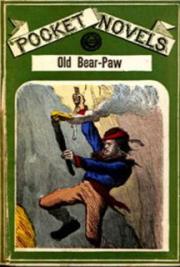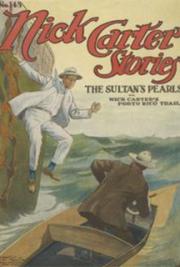CHAPTER XV
Gard and Helen were married late in January. Gard’s patience, and hard-won philosophy, seemed wholly to desert him at the thought of longer delay.
“One would think,” Helen laughed, as he pleaded with her to set an earlier day, “that you were afraid I might vanish.”
“I am,” answered Gard. “I always have been, from the minute I saw you come around the corner of the house that morning, with your tray and grape-fruit, I’ve been expecting I’d wake up some day and find that this part of the dream isn’t true.”
Helen’s cheek lingered against the hand which he put out as if to reassure himself of her presence.
“It is true,” she said, softly, “truer than the other parts, the hard, cruel parts. They are the things that have vanished, dear.”
“I guess you’re right,” was Gard’s reply. “They were the dream, and this is the waking-up; the blessed waking-up.”
“Do you know,” he suddenly said, “it was the longest kind of a time—up in the mountain—before I got over being afraid, just before I’d open my eyes in the morning?”
“Afraid?”
“Yes. That I might see—might not see—the open.”
“Yes, dear?”
Helen spoke quietly, though it seemed to her as if her suffocating heart beats must betray to him what she was feeling. Gard had told her of his escape from the cloudburst; all the incidents of his Robinson Crusoe life, as she called it, of the coming of the camel; of that wonderful journey to the glade; of the glade itself; but this he had never spoken of. She had thought of it as a door in his heart yet closed against her. Now it was opening, to admit her to his chamber of sorrow.
“I don’t know what kept me alive through those other years,” he continued. “Sometimes it seems to me there wasn’t much there worth keeping alive. There wasn’t much got away but a rack of bones, held together by hate.”
Helen’s hands stole out and found both his as he went on.
“I thought I’d got to get out,” he seemed as if thinking aloud, “I thought I’d got to get out some day, just to kill Westcott. Then when I did get away, I hadn’t anything left but the longing to crawl off somewhere and die. I’m not sorry about that now, though often, in the mountain, I raged, to think I couldn’t have killed him that night. Then I learned better. But I feel mighty thankful now, that I never hurt him.”
“You would never have hurt him,” Helen murmured.
“There were times when I would if I could have got to him,” Gard replied, “but I got over my hate. Somehow, that kind of thing can’t live in big, clean places like that I drifted to. The desert’s a hard place, my girl. It don’t look lovely as this when you’re fighting for life in it. It’s fierce as a tiger, but there ain’t any hate in it. That’s only in men, but it’s deadlier than anything the desert’s got.”
“There’s got to be desert, I guess. There was a man in the surveyor’s gang I was with once, years ago, always said that. He said you take away the desert and some of the glorious climates on this slope would all be gone.”
“I’m talking a lot”; he interrupted himself with half a laugh, “but just once, this thing’s got to be looked at; because it was so black, and I can’t let you think I wasn’t black with it. It took that, I guess, along with the rest of it all, to make me see things the way I do now; but I ain’t asking pity for it. It was a desert place, sure enough, but now it’s over. I guess I learned some things worth while. Then when I got out on the big desert, dear, I found God there, same’s I’d believed when I was a boy, back on the prairie. I shouldn’t wonder if He’d been there in the jail, too. That’s the truth of it.”
The girl leaned quickly, and gathered both his hands to her lips, love, thankfulness, and pride in his manhood, all struggling for expression. Stout old Chaucer’s brave words came to her mind, and she said them aloud, with lips yet trembling with tenderness.
“And truth thee shall deliver, it is no drede.”
“That sounds like one of your old poets,” he said, “and I guess he may have been in the desert and learned. ‘There is no drede’,” he repeated, thoughtfully. “I suppose he means no fear. That’s right.”
He was looking into Helen’s eyes, his two hands closing over hers.
“There is no fear,” he asserted. “There is nothing to fear. Oh, girl—my girl! With hate gone, and love come in, there’s nothing in the wide world to fear!”
February was well along when first they saw the glade together. Morgan Anderson and Gard had organized a company which, later, was to exploit the mine. Gard had seen to it that Sandy Larch had an interest, and Mrs. Hallard. Kate Hallard had gone away from Sylvania, but her matters were in good hands. She had sold her business to Sing Fat, and gone to California.
“For one thing,” she had said to Helen, when the two had a long talk together. “I’m goin’ to learn t’ talk decent. I can’t stand it. Sometimes when I’m sittin’ still, not sayin’ a word, jes’ listenin’ to you, seems’s if the language I’m thinkin’ in is makin’ a noise, it is so howlin’ bad.
“Don’t you think I don’t know; ner don’t you b’lieve it don’t make no difference. It makes a difference inside me. I’m sick of it. Sick of all ’t means to me. I never had a chance to find it out before; but now I know, an’ I can’t bear it. I’m goin’ t’ learn somethin’, an’ then, so long’s I always want to work—you couldn’t make a lady o’ the likes o’ me, not if you laid the money on with a trowel,—I’m goin’ to work at something worth while, an’ if I ain’t too old I’m goin’ to learn to be a nurse. Anyhow, it’s good-by the eatin’ house fer mine!”
Helen and Gard went with the first outfit of mining-supplies to the claim. These were taken by wagon to the foot of the mountain, and thence, up the trail, on the backs of the mules that had pulled them. Gard had gone for Jinny, bringing her by rail to Yuma, their point of departure, and she and Helen had become friends forthwith. Together they led the procession up the ancient wash; for Helen insisted upon walking, and her saddle horse and Gard’s followed in the rear.
The glade lay in the pleasant afternoon sunshine much as it had done the day that Gard said good-by to it. A big live-oak branch had fallen across the ocotilla bed where he had often rested. Helen surveyed the rude structure with quivering lips, as he pulled the branch away.
Sandy Larch was unloading the animals, piling up the stores, and getting things into shape, with the help of the three men of the outfit. By the big fireplace against the rock Wing Chang, who had cast in his fortunes with the new company, was taking stock of Gard’s culinary apparatus.
“What do you think of it, Chang?” the latter asked, as the cook investigated the upturned bean-pot.
“Where you catchee him?” the Chinaman demanded, much mystified.
“I made it. Made them all.” Gard waved a hand at the various fire-blackened clay pots. Chang tapped the bean-kettle with an investigating knuckle, testing its soundness.
“Him no clacked,” he said, with a grunt. “Mebby you no clacked; mebby so allee lightee.”
And no further expression of opinion could be won from him.
Helen made a swift round of the place, Gard following, scarcely able to believe in his own happiness. She inspected the cabin, and cast her vote for living outside it. The seats and tables that Gard had contrived gave her great delight, and she rejoiced in the flaming green of the volunteer crop of oats into which Jinny had already found her wilful way.
“I dare say your gold-mine’s all right, Gard,” Sandy said, coming up to survey the oat patch, “but if it shouldn’t be, there’s another one right on this here plain, if that water was turned acrost it.”
“I vum!” He pulled a head of oats and examined it. “The Palo Verde’s a howlin’ wilderness,” he avowed, “to what a man could have here.”
Gard laughed as he led Jinny ignominiously out of her green field.
“No reason why you shouldn’t be that man,” said he. “It’s government land, all ready to be entered upon.”
“If that’s a fact,” was Sandy’s reply, “an’ you ain’t got no intentions on it, then Sandy Larch, cow-punch, is likely to blossom out as A. Larch, rancherio. Can’t you see me a swellin’ señor?”
Wing Chang’s bright fire was lighting up the trees and rocks when Helen, who had been bestowing her belongings inside the cabin, came out with something in her hands.
“What is this?” she demanded of Gard, still hovering near.
He took the big shell from her and stirred the palo verde thorns about, his mind a surge of emotions.
“What are those for?” Helen asked, again.
“Why,” he said, at last, “they’re my tally of the days I lived in the glade.”
She looked at them, in the twilight, her face touched with wonder.
“How many, many there seem to be,” she murmured.
“There ought to be somewhere about seven hundred, I suppose,” was Gard’s reply. “We don’t need ’em any more. Let’s help along the blaze with ’em.”
She caught his hands, with a little cry of dismay.
“No! No!” cried she, “You must not destroy them! Your record of days; hard, thorny days.” She covered the thorns with one hand, in a passionate gesture of protection.
“They were good days,” he answered, trying to comfort her. “I got a lot of good out of them.”
“But oh, the price you paid!” Tears glistened in her eyes.
They were in the shadow of a big live-oak, and he drew her to him.
“It was sure a man’s price,” he said, looking into her face. “But I got full value for it.”
The night was far spent when Gard awoke. A late moon rode high in the heavens, flooding the glade with white light. The familiarity of the scene bewildered his rousing consciousness. The circling trees, the murmur of water, the far-seeming faint glow of embers in the great fireplace, his narrow ocotilla bed with its bear-skin covering: how well he knew them all! Had he but slept and dreamed, to awaken after all to the daily round of his accustomed solitude?
He raised himself upon one elbow. On the cot which they had brought for her, there, within reach of his hand, Helen lay sleeping. A beam of the white light sifted down through encircling trees and fell across her face, round which the night wind had fluttered her hair to soft disorder. Her head was thrown back, her chin nestling in one supporting palm. The pure, tender outline of brow and cheek thrilled him as he gazed, his soul touched to awe.
Long, long he looked, worship and wonder stirring the deeps of his nature. It was no dream; she was there beside him; there was no drede.
He sank back upon his pillow, tears of supreme happiness brimming his eyes, and yielded him wholly to the quiet and peace of the large place.
THE END.







